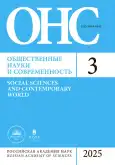GERMANS OUTSIDE GERMANY: SYSTEM OF SUPPORT FOR COMPATRIOTS ABROAD
- 作者: Kotov A.V.1
-
隶属关系:
- Institute of Europe of the Russian Academy of Sciences
- 期: 编号 3 (2025)
- 页面: 34-47
- 栏目: International relations
- URL: https://journals.eco-vector.com/0869-0499/article/view/691340
- DOI: https://doi.org/10.31857/S0869049925030037
- EDN: https://elibrary.ru/kaguxo
- ID: 691340
如何引用文章
详细
The experience of interaction between Germany and its compatriots and fellow countrymen – representatives of German national minorities abroad is examined. Depending on the addressees, this policy includes various instruments to strengthen their ties with the homeland. The legal framework for working with compatriots, the practice of cooperation with the main national institutions are studied, and the financial costs of this area of foreign policy are estimated. The experience of Germany is presented as the practice of a layered system of support for citizens working abroad, historically established German ethnic diasporas. It is concluded that Germany is expanding social and humanitarian interaction with the countries where the diasporas are located, positioning these communities as a soft power factor. The multi-vector German strategy aimed at maintaining the identity of Germans and promoting ties between German communities and their historical homeland dictates the need for a symmetrical policy on the part of Russia towards Germany, excluding politicizing this area.
作者简介
A. Kotov
Institute of Europe of the Russian Academy of Sciences
编辑信件的主要联系方式.
Email: alexandr-kotov@yandex.ru
Moscow, Russia
参考
- Agamoglanov E.M. (2023) Geodemographic analysis and mapping of the German diaspora in Russia. Uchenye zapiski Krymskogo federal'nogo universiteta imeni V.I. Vernadskogo. Geografiya. Geologiya., vol. 9, no. 2, pp. 3–16. (In Russ.)
- Grosheva G.V. (2019) Between the “Old” and “New” Homeland: Representations of Russian Germans in Germany. Tomsk State University Journal of History, no. 59, pp. 130–141. https://doi.org/10.17223/19988613/59/18 (In Russ.)
- Gulina O.R. (2010) Spätaussiedler, or Russian Germans in Germany. Contemporary Europe, no. 2, pp. 62–75. (In Russ.)
- Leontyeva E.O. (2017) Russian Germans in Search of Identity: Strangers Among Their Own, Their Own Among Strangers. Review of the book: Denisova-Schmidt E. (2015) Russian Germans. Geschichte und Gegenwart. Zeitzeugen erzählen über Heimat, Migration und Engagement, Stuttgart: Ibidem-Verlag. Mir Rossii, vol. 26, no. 1, pp. 198–202. (In Russ.)
- Magomedova Z.G. (2019) Problemy sovershenstvovaniya zakonodatel'stva: sbornik nauchnykh statei studentov yuridicheskogo fakul'teta SKI(f) VGUYU (RPA Minyusta Rossii). Vypusk 80/19. Makhachkala: ALEF. Pp. 224–227. (In Russ.)
- Ogneva A.V. (2011) German schools abroad as an instrument of foreign cultural policy of the FRG. Tomsk State University Journal, no. 351, pp. 96–99. (In Russ.)
- Ogneva A.V. (2012) In the service of state interests: non-governmental organizations in the foreign cultural policy of Germany. Diplomatic Service, no. 4, pp. 22–27. (In Russ.)
- Seliverstova S.N. (2012) German Diaspora in Russia: National and Cultural Identity. Bulletin of the Moscow State University of Culture and Arts, no. 4(48), pp. 77–81. (In Russ.)
- Strovskiy L.E. (2009) On new forms of support for migrants in Germany. UPI. Seriya: Ehkonomika i upravlenie, no. 1, pp. 65–70. (In Russ.)
- Sukhanov K.A. (2022) Participation of National Minorities in Public Affairs of the State: German Experience and Instruments/ Journal of Foreign Legislation and Comparative Law, vol. 18, no. 3, pp. 125–136. https://doi.org/10.12737/jflcl.2022.042 (In Russ.)
- Chumakov V.A. (2021) Political contexts of «soft power» and cultural and educational diplomacy of European countries as channels of local-global interactions. Science. Culture. Society, vol. 27, no. 4, pp. 17–29. https://doi.org/10.19181/nko.2021.27.4.2 (In Russ.)
- Blackbourn D. (2015) Germans Abroad and Auslandsdeutsche // Geschichte und Gesellschaft, vol. 41 (2), pp. 321–346. https://doi.org/10.13109/gege.2015.41.2.321
- Kuehl J. (2004) National minorities and cross-border cooperation between Denmark and Germany. Razprave in Gradivo – Treatises and Documents, vol. 44, pp. 82–105.
- Lafleur J.-M., Vintila D. (Eds.) (2020) Migration and Social Protection in Europe and Beyond (Vol. 2). Comparing Consular Services and Diaspora Policies. IMISCOE Research Series, 2. Springer, Cham, Switzerland. 481 p.
- Nickl B. (2017) Outside the Nation: Taking Stock of a Sense of Duty and Diversity in German Studies Abroad. In: Transnational German Education and Comparative Education Systems. Springer, 2017. 193 p. Pp. 65–83.
- O’Donnell K.M., Bridenthal R., Reagin N. (Eds.) (2005) The Heimat Abroad: The Boundaries of Germanness. University of Michigan Press. 336 p.
- Penny G., Rinke S. (2015) Germans Abroad. Respatializing Historical Narrative. Geschichte und Gesellschaft, vol. 41 (2), pp. 173–196. https://doi.org/10.13109/gege.2015.41.2.173
- Wolff S. (2002) The Politics of Homeland: Irredentism and Reconciliation in the External Minority Policies of German Federal Governments and Expellee Organisations. German Politics, vol. 11 (2), p. 105–127. https://doi.org/10.1080/714001279
- Yildiz E., Hill M. (2014) Nach der Migration: Postmigrantische Perspektiven jenseits der Parallelgesellschaft. Wetzlar, Majuskel Medienproduktion Gmb H. 298 p.
补充文件









